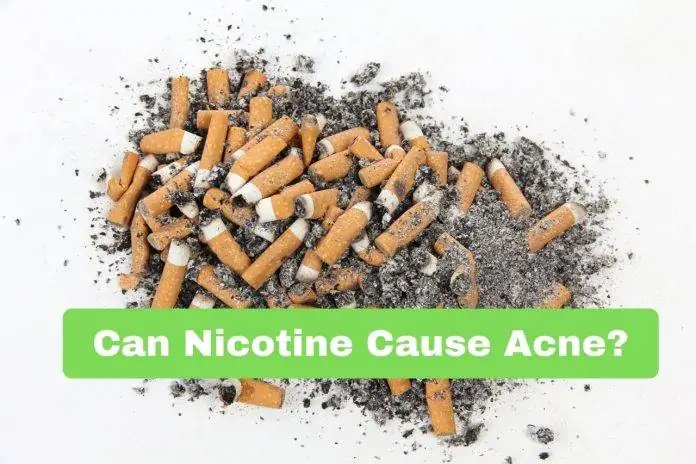If you are considering using nicotine products such as electronic cigarettes, you may want to know if can Nicotine cause Acne. There is a lot of debate about whether or not they actually do. This article will cover several topics pertaining to this topic, including oxidative stress, the effects of diacetyl in electronic cigarettes, and some of the symptoms of acne flare-ups.
Diacetyl in electronic cigarettes
Diacetyl in electronic cigarettes has caused some vapers to experience acne flare-ups. The chemical is used to make different flavorings for vape products, and is often present in vape eliquid. However, researchers have raised concerns about diacetyl’s effects on the respiratory system.
In 2002, a study found that the chemical diacetyl causes lung damage in people who work in microwavable popcorn factories. Researchers have also linked diacetyl to a disease called bronchiolitis obliterans. This condition is characterized by severe inflammation of the airways, and causes scarring and stiffening of the airways. Unless treated, it can cause permanent lung damage.
Vaping with diacetyl has been banned in the European Union. ECITA requires that members test their eliquid for impurities before releasing it to the market. If impurities are found, the manufacturer must withdraw them from the product.
The ECITA is working to ensure that its members are not selling e-liquid with diacetyl. It’s also trying to improve the safety of e-cigarettes.
Oxidative stress
Acne vulgaris is one of the most common skin diseases among young people. It is characterized by follicular hyperkeratinization, inflammation and overproduction of sebum. This inflammatory condition is usually associated with the presence of free radicals.
Various studies have shown that antioxidants have the potential to reduce acne lesions. However, few studies have looked into the role of the antioxidant system in the pathophysiology of acne.
The antioxidative system is a vital part of our body’s defense against harmful stimuli. We naturally produce a number of free radicals, called oxidants, during physiological aerobic metabolism, exercise, and inflammation. These oxidants have the ability to damage the cell membranes. But, too much oxidation can be harmful.
Oxidative stress has been shown to play a significant role in the development of acne. As a result, a clinical trial was conducted to investigate whether oxidative stress can play a role in the pathogenesis of acne.
Acne patients showed a higher amount of lipid peroxidation than healthy individuals. UPE (ultra-weak photon emission) imaging was used to assess the extent of oxidative stress in the facial skin.
Stimulation of the immune system
The ability of nicotine to induce the immune system to fight infection is an important determinant of its anti-inflammatory effects. However, the mechanism behind these actions is not clear. There are several possible explanations. Among these, an increase in immunological tolerance to nicotine could be one. Other possibilities include the potential to modify inflammatory responses.
Several studies have examined the effect of nicotine on the immune system. In particular, nicotine has been shown to modulate TLR2/MyD88/IL-8, TLR2/IL-1b, and LC3II/LC3I. It also downregulates the production of pro-inflammatory cytokines such as IL-1b and TNF-a.
A number of studies have found that nicotine has a positive effect on inflammatory diseases such as rheumatoid arthritis. Although the relationship between smoking and asthma is highly controversial, it seems plausible that nicotine could inhibit inflammatory reactions to allergies.
For example, nicotine stimulation decreased eosinophil count, increased the production of a substance P-like peptide, and lowered blood pressure. These results were independent of vagal innervation.
Symptoms of acne flare-ups
If you’re a smoker, you might be surprised to learn that you are at an increased risk for developing acne flare-ups. Smoking constricts blood vessels and reduces the amount of oxygen and nutrients your skin cells get. This can cause more acne breakouts, especially when you’re already dealing with existing inflammatory acne.
While some vapers have claimed that their acne cleared up after they stopped smoking, others believe it caused their flare-ups. Acne is triggered by excessive sebum production, which is also triggered by dry skin. Also, makeup can mix with your skin’s natural oils, leading to clogged pores. You can prevent flare-ups by using a balanced diet and maintaining healthy lifestyle habits.
To help minimize your risk of developing acne flare-ups, it’s best to quit smoking altogether. Not only can you end up with serious health problems, but you’ll be able to experience massive cravings and mood swings.
You’ll also need to make lifestyle changes to help your body heal from the damage nicotine does. For example, you should avoid eating heavily salted foods. You should also limit your intake of dairy products. Dairy products can irritate your skin, which can increase the amount of inflammation you have.




